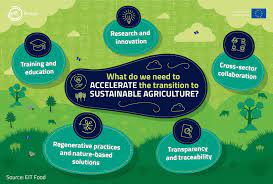In the face of global challenges such as climate change, resource depletion, and food insecurity, sustainable food production practices have become increasingly important for ensuring the long-term viability of our food systems. Sustainable food production focuses on minimizing environmental impact, conserving natural resources, promoting biodiversity, and enhancing the resilience of agricultural ecosystems. In this article, we explore key sustainable food production practices and their significance in promoting food security, environmental stewardship, and social equity.
Agroecology and Organic Farming
Agroecology and organic farming practices prioritize soil health, biodiversity, and ecosystem resilience while minimizing the use of synthetic inputs such as pesticides and fertilizers. These practices include crop rotation, polyculture, cover cropping, and integrated pest management, which enhance soil fertility, reduce pest pressure, and promote natural ecosystem functions. By fostering healthy and biodiverse agricultural ecosystems, agroecology and organic farming contribute to sustainable food production while minimizing negative environmental impacts.
Conservation Agriculture
Conservation agriculture encompasses practices such as minimal tillage, mulching, and crop residue management, which help conserve soil moisture, prevent erosion, and maintain soil structure and fertility. By minimizing soil disturbance and preserving soil cover, conservation agriculture reduces the loss of soil carbon, enhances water infiltration, and promotes soil health and resilience. These practices improve the sustainability and productivity of agricultural systems, particularly in regions prone to soil degradation and water scarcity.
Agroforestry and Silvopasture
Agroforestry and silvopasture systems integrate trees, shrubs, and livestock with traditional agricultural crops, providing multiple benefits such as enhanced soil fertility, increased biodiversity, and improved resilience to climate change. Agroforestry practices include alley cropping, windbreaks, and riparian buffer zones, which help sequester carbon, reduce greenhouse gas emissions, and mitigate soil erosion and water runoff. Silvopasture combines trees with pastureland for grazing livestock, offering shade, forage, and shelter while enhancing ecosystem services and biodiversity.
Sustainable Water Management
Sustainable water management practices aim to optimize water use efficiency, reduce water waste, and protect water quality in agricultural production systems. These practices include drip irrigation, rainwater harvesting, and water-efficient crop varieties, which help conserve water resources, minimize irrigation runoff, and mitigate water pollution from agricultural runoff. By adopting sustainable water management practices, farmers can improve crop yields, reduce production costs, and enhance the resilience of agricultural systems to drought and water scarcity.
Climate-Smart Agriculture
Climate-smart agriculture integrates sustainable farming practices with climate change adaptation and mitigation strategies to enhance agricultural resilience and reduce greenhouse gas emissions. These practices include agroforestry, conservation agriculture, and precision farming techniques, which help farmers adapt to changing climatic conditions while mitigating the environmental impact of agriculture. By implementing climate-smart agriculture practices, farmers can improve crop productivity, reduce vulnerability to climate-related risks, and contribute to climate change mitigation efforts.
Sustainable Livestock Management
Sustainable livestock management practices focus on promoting animal welfare, minimizing environmental impact, and optimizing resource use in livestock production systems. These practices include rotational grazing, mixed-species grazing, and feed efficiency measures, which help reduce greenhouse gas emissions, minimize land degradation, and improve the efficiency of feed conversion. By adopting sustainable livestock management practices, farmers can enhance the sustainability and resilience of livestock production systems while meeting growing demand for animal protein in a resource-constrained world.
Local and Regenerative Food Systems
Local and regenerative food systems prioritize the production, distribution, and consumption of locally sourced, seasonal, and sustainably grown food products. These systems emphasize short supply chains, direct farmer-consumer relationships, and community-based food initiatives, which promote food sovereignty, support local economies, and reduce the carbon footprint of food production and transportation. By fostering resilient and diverse food systems, local and regenerative food systems contribute to food security, social equity, and environmental sustainability at the local and regional levels.
In conclusion, sustainable food production practices are essential for addressing the complex challenges facing our global food systems, from climate change and resource depletion to food insecurity and social inequality. By embracing agroecology, conservation agriculture, agroforestry, sustainable water management, climate-smart agriculture, sustainable livestock management, and local and regenerative food systems, we can create more resilient, equitable, and environmentally sustainable food systems that nourish people and the planet for generations to come.

